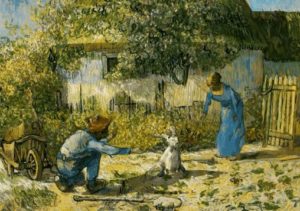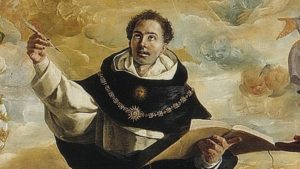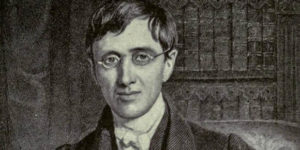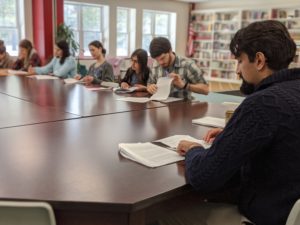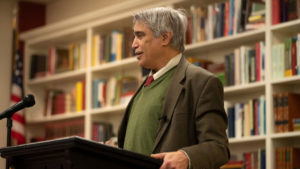Each of our eight “Philosophy and Humanities” courses may be best understood as a tapestry or polyphonic composition within which the lines of Philosophy, Literature, History, Music, Theology, Science, and Political Philosophy and Economy conjoin to form a single whole. Even as our attention shifts from one line to the other, we remain aware of the larger whole to which they belong. Through the integration of these disciplines within an eight-semester series of courses, we consider carefully the manifold expressions of a created, transcendence-seeking human nature living in relation to God, other persons, and the natural world while seeking both natural and transcendent ends.
These courses are animated by the pursuit of wisdom within a great conversation across time, seeking the answers to what Pope Saint John Paul II called the fundamental, perennial questions, such as “What is human nature and what are the implications of this nature?” “How do we understand freedom and human flourishing?” “How ought we to order our lives together politically?” and “What is the role of tradition and history in how we understand ourselves and the world?”
Each course may be conducted through a variety of pedagogical means, including an all-college class led by a panel of students or faculty, a direct presentation by a tutor, a smaller seminar, or some combination of the three. In each case, students, tutors, and the authors of the cultural artifacts we study engage in the collaborative pursuit of an ever-deepening encounter with reality. In each case the student takes upon himself or herself the agency of learning within a community united and ordered to that purpose.
5 credit hours per semester
+
During these first two semesters we turn our attention—primarily through the reading of literature and philosophy—to the horizon of metaphysical and political inquiry, where each of us can begin to recognize the great philosophical questions that play a part not only in the lives of the great thinkers but in the lives of all human beings (including ourselves). If we had believed before now that the search for wisdom was to be taken up only by the few, this course suggests that all of us are called to pursue wisdom about God, nature, ourselves, and how best to live our lives together. Such a pursuit is not trivial; it is of the greatest consequence.
While taking up these questions, we also turn to the foundations of western civilization as well as key sources from the East. Through the careful reading of epic poetry, history, political philosophy and economy, tragedy, comedy, biography, and philosophy, we immerse ourselves in some of the chief sources from which we learn how to be fully human.
Texts and authors of the first semester include: Homer, The Epic of Gilgamesh, Hesiod, Herodotus, Heraclitus, Parmenides, Aeschylus, Plato, Aristotle, Thucydides, and Plutarch.
Texts and authors of the second semester include: Aeschylus, Sophocles, Euripides, Aristophanes, Plato, Aristotle, Plutarch, and Lao Teu’s Tao Te Ching.
5 credit hours
+
Shifting our attention from ancient Greece and the East to Rome, we study the origins of the Eternal City, its political and military achievements, and selected works by its greatest statesmen, historians, poets, and philosophers.
With a clearer understanding of the world into which Christianity was born, we then turn our attention to the Church and the seeds from which it grew: its earliest martyrs and saints. To complement our readings of scripture in the courses on theology, we read texts by the Fathers of the Church as well as her poets, attending to their lives and writings and considering the significance they have for us at the beginning of the Church’s third millennium. Together we consider the confluence of “Athens” with “Jerusalem” and the emerging intellectual foundations that will constitute the intellectual disciplines that animate the life of learning in the Middle Ages: philosophy, theology, literature, politics, political economy, and the visual and musical arts.
Texts, authors, and artifacts of this fall semester include: Livy, Polybius, Plutarch, Sallust, Cicero, Vergil, Horace, Ovid, Seneca, Tacitus, Plotinus, selected early Christian Fathers, the Passion of Sts. Perpetua and Felicity, the Desert Fathers, The Life of St. Antony, Augustine’s Confessions, The City of God, Ambrosian chant, Prudentius’ Psychomachia, Boethius, Gregory the Great, the Rule of St. Benedict, the Koran, and Roman, Jewish, early Christian, Byzantine, and Islamic art.
5 credit hours
+
In this spring semester, we immerse ourselves in the flowering of culture in a transformed Western civilization that becomes the foundation of the cultural and philosophical synthesis of the High Middle Ages. Authors and texts include: Einhard’s Life of Charlemagne, Anglo-Saxon poetry, Beowulf, St. Anselm and Gaunilo, Abelard and Heloise, St. Bernard, Medieval Lyrics, the Song of Roland, the Rule and Testament of St. Francis, Alfarabi, Maimonides, Rumi, Thomas Aquinas, Bonaventure, the Life of St. Louis, Dante, Sir Gawain and the Green Knight, Scotus, Giles of Rome, John of Paris, Marsilius of Padua, Ockham, Julian of Norwich, the Second Shepherd’s Play, Chaucer, medieval Christian art, chant by Abelard and Hildegard of Bingen, songs by the Troubadours known by Dante, polyphony by Machaut, and an illuminated manuscript, the Très Riches Heures.
Through the interplay of disciplines (some of which were discovering new autonomy), we witness the creation in medieval Christendom of a tapestry of learning produced by minds and lives that figure prominently in any account of the of the Middle Ages. Philosophy, theology, literature, politics, political economy, and the visual and musical arts each play their role in constituting a play of worlds irreducible to a single (religious or non-religious) perspective.
5 credit hours
+
Having scaled the summit of the High Middle Ages in the previous semester, we turn our attention this semester to worlds discovered, destroyed, reborn, and renewed. Irreducible to a single set of themes, the plurality of voices from this period are heard in both their harmony and their discord. From the rediscovery of antiquity’s animating sources to the deformation of a stable Christendom, the triumph and tragedy of a new era prompts us to consider carefully texts that capture the spirit of a new age and articulate the causes of Christendom’s division. At the same time, the initiatives of Machiavelli and Luther lead us to consider again the certainties upon which the Old World stood. All of this finds its way to the stage, where the Bard and his contemporaries will renew our attentiveness to the questions that animate and undergird the truly human life.
If the Middle Ages appeared to offer stability, this period’s texts–drawn from the disciplines of literature, philosophy, history, theology, political philosophy and economy, music, and painting–suggest a world of layered but broken dialectics in which voices speak louder as fruitful dialogue seems to elude the interlocutors.
Texts and authors of the semester include: Thomas More, Erasmus, Pico della Mirandola, Marlowe, Shakespeare, Machiavelli, Luther, Calvin, the documents of the Council of Trent, Teresa of Avila, John of the Cross, Ignatius of Loyola, Francis de Sales, John Fisher, Thomas à Kempis, Robert Southwell, art of the Renaissance and Counter-reformation, Milton, Bacon, Galileo, the Metaphysical Poets, and the music of Dufay, Josquin, Henry VIII, Palestrina, and Bach.
5 credit hours
+
Without slackening our pace, we consider—with Kant—the question, “What is Enlightenment?” and we ask “What are its fruits?” To answer these questions we listen closely to voices speaking from newly- founded (and re-founded) nations, voices both triumphant and tragic. While reading thinkers writing from the disciplines of philosophy, theology, political philosophy and economy, we also take up the writings of historians, poets, and statesmen who reveal human nature and existence with clarity, highlighting its heroic, pathetic, profound, fragile, demonic, and ultimately risible features. All the while we are reminded—sometimes unintentionally—that new light can occasionally blind us and that even those with the keenest vision stand in need of redemption.
Authors, and texts, and artifacts studied in this semester include: the Rime of the Ancient Mariner, D’Alembert, Tocqueville, Hobbes, Descartes, Pascal, Locke, Hume, Kant, Rousseau, Locke, Burke, Melville, Dostoevsky, Conrad, art of the eighteenth century, and the music of Mozart, Haydn, and Beethoven.
5 credit hours
+
In this semester we take up the symbolic form of America, with emphasis on her founding, her conception of liberty, and the place of equality in her society, focusing on the formative documents of our nation and her most representative literature and thought. Authors include: the Puritans, Hawthorne, Melville, Thoreau, Emerson, Dickinson, Twain, Faulkner, Fitzgerald, Tocqueville, Black Elk, Lincoln, Whitman, Sojourner Truth, Frederick Douglass, Booker T. Washington, and W.E.B. Du Bois.
5 credit hours
+
We come now to our own age, recognizing that our previous years of study in philosophy and the humanities have prepared us only imperfectly for the fruits of “late” or “post” modernity. The contradictory appellations of our time elicit wonder: are we still living within the unfolding of the enlightenment project, or are we truly in a new age? And how might we relate to the synthesis left behind from antiquity and the Middle Ages?
Beginning at the threshold of our own era, we witness the Enlightenment’s transformation into an Age of Revolution, seeking to discern the paradoxes that exist at the heart of modernity. Taking as our guides a broad range of philosophers, poets, essayists, composers, and filmmakers, we consider carefully questions raised by modernity and the many destructive aspects of its history such as the Holocaust. With equal attention we consider the ways in which western philosophers, theologians, and artists have imagined how we might build anew. Through our discussions we revisit questions raised in the first year of “Philosophy and Humanities” (and in the years that have followed): “What is the nature and telos of the human person?” “In light of these how should we order our political lives?” “How can the human person flourish in our contemporary age?” and “How do we effectively renew the Church and our culture while serving the communities in which we live?”
Within this course we synthesize the insights of the previous seven semesters, bringing together the wisdom we have gained from a variety of disciplines: philosophy, theology, political philosophy and economy, history, literature, and the visual and musical arts.
Authors, filmmakers, artists, and composers include: Dostoevsky, Tolstoy, Kierkegaard, Heidegger, Newman, Freud, Jung, Marx, Nietzsche, Voegelin, DeLubac, Hopkins, Faulkner, Arendt, Solzhenitsyn, Pieper, the documents of Vatican II, John Paul II, Pieper, Anscombe, Havel, and MacIntyre.
Students will have the opportunity to take one of the following courses for college credit. Taught in Socratic-style seminar discussions, each course enables students to explore a particular interest and consider whether they might like to pursue that academic discipline as a potential college major. Students will spend 3.5-4 hours in class each day, have some assigned homework, and spend the remaining time in prayer, liturgy, sacred music, relaxation with new friends, and a wide range of extra-curricular activities.
Theology of the Body: The Deeper Meaning of Love, Sex, and Marriage (1 credit) – Dr. Ryan Messmore
THIS COURSE IS NOW FULL
When it comes to romantic relationships and marriage, today’s culture is awash in confusion. The Church calls people to see a deeper meaning to sexual desire and marriage. But what is that, and how can it be pursued in modern times? Saint Pope John Paul II has provided valuable teaching in this area. Along with his “Theology of the Body,” this course will explore the nature of love, the meaning of betrothal and marriage, and sexual ethics from a Christian perspective. Class discussions will be theological and philosophical as well as practical.
Philosophy & Humanities: Friendship in Western Culture (1 credit) – Dr. Brian FitzGerald and Dr. Erik Van Versendaal
THIS COURSE IS NOW FULL
One of the most important features of human experience is friendship. Drawing on the great books of Western culture in literature, history, philosophy, and theology, from Aristotle and St. Augustine to Jane Austen and C.S. Lewis, this course will reflect on the nature of friendship across the centuries. Why do we need friends? What makes a good one? What are some obstacles to friendship? What happens as friends grow and mature in different ways?
Christ in Scripture (1 credit) – Deacon Karl Cooper
THIS COURSE IS NOW FULL
“Did not our hearts burn within us while he talked with us on the road, while he opened to us the Scriptures?” In this course we will seek to meet and understand Christ as he presents himself in all the Scriptures. We will read, discuss, enjoy, and pray through the most crucial texts, and focus our work on the living and present Christ.
$395.00 USD
Tuition includes room and board. The purchase of a book may be required for some classes. Students should bring spending money for off-campus trips.
Students will have the opportunity to take one of the following courses for college credit. Taught in Socratic-style seminar discussions, each course enables students to explore a particular interest and consider whether they might like to pursue that academic discipline as a potential college major. Students will spend 3.5-4 hours in class each day, have some assigned homework, and spend the remaining time in prayer, liturgy, sacred music, relaxation with new friends, and a wide range of extra-curricular activities.
Physics: Understanding Boomerangs, Billiard Balls, and Balance Beam Routines (1 credit) – Mr. John Klucinec
THIS COURSE IS NOW FULL
This course explores the laws of motion as described by Galileo and Newton by reading and discussing these authors and through classroom experiments. Students will gain an understanding of physics in concrete phenomena through studying air flight, fluid dynamics, the aerodynamics of the boomerang, the motion of billiard balls, and the physics of gymnastics and diving.
Poetry and Politics in the Western Tradition (1 credit) – Dr. Mary Mumbach
THIS COURSE IS NOW FULL
This course will examine poetic form and political form in the tradition of the West. Students will explore, in particular, how the Incarnation shapes the roles of imagination, prudence, and the heroic in literature and political philosophy. Readings in poetry, fiction, and American Founding documents will be considered.
Moral Philosophy: How Do We Make the Right Decisions? (1 credit) – Rev. Fr. Stephen Rocker
THIS COURSE IS NOW FULL
Natural law morality and utilitarianism are incompatible frameworks of moral reasoning, yet elements of both are mixed in the public mind. Catholic moral teaching and the Western system of law are grounded in natural law. This course will present these two moral frameworks and apply them to moral issues.
$395.00 USD
Tuition includes room and board. The purchase of a book may be required for some classes. Students should bring spending money for off-campus trips.

